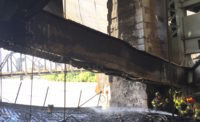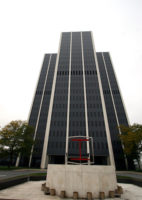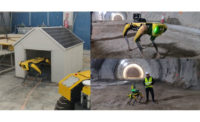Who owns the model building code that sets the legal safety minimums adopted by many states and cities?
That’s an issue that could be decided in a lawsuit brought by The International Code Council (ICC) against UpCodes, a for-profit company that provides searchable databases of published state and local building codes. ICC is a nonprofit that is the developer of the International Building Code, which is widely used in North America as a model code.
The outcome could bring clarity, or speed change, to the way designers read and use codes during the design process. It could also drain funds from a codewriting non-profit that helps make buildings safe.
Filed in 2017 in federal district court in New York City, the lawsuit is slowly heading to trial next year. Both parties have put detailed arguments and evidence into the court record and ICC has asked the court for summary judgment in its favor. The outcome could change the way designers use code, but it could also drain funds away from a codewriting nonprofit that helps make buildings safe.
The American Society of Civil Engineers also filed suit in 2017 as a co-plaintiff, but ASCE no longer is part of the lawsuit.
Model codes are usually available on a limited basis for free. Membership in ICC starts at $50 a year for individuals and $450 for companies, entitling members to discounts on sections of the code that cost, in PDF and paper versions, $136 to $216, according to prices posted on ICC’s website. Like many software companies, UpCodes provides all types of access—read, copy, print—to codes for free and then sells use of premium tools starting at $29 and $49 a month, for individual and team use, respectively.
But keeping up with a code revision cycle, especially for the "full library" of codes used by building or fire departments, can cost tens of thousands of dollars.
ICC, which had revenue of all types of $65 million in 2017, portrays the copyright issue as an existential threat to its consensus process and public safety via the code. But it's grip on the copyright is gradually slipping. Three regional model codes merged to create ICC in 1994, and two of them—the Building Officials and Code Administrators International (BOCA), used in the east and Midwest, and the Southern Building Code Congress International (SBCCI), used mainly in the south—previously litigated related copyright issues.
In the BOCA v. Code Technology case (1980), a publisher had sold copies of the Massachusetts state building code. The First Circuit federal court decided that the citizens are authors of the law, and hence, are its owners, regardless of who actually writes the provisions of the law.
And in SBCCI v. Veeck (2002), where a website operator posted parts or all of that code, the Fifth Circuit U.S. appeals court determined that model codes which enter the public domain are not subject to the copyright holder's “exclusive prerogatives.” One of the key issues is whether publication of parts of ICC’s code in state and local codes, which are law, invalidates ICC’s copyright. The court basically said yes.
The ICC says it filed the lawsuit to prevent UpCodes from attempting to make a profit for its owners and shareholders by taking, without paying for, building codes that the Code Council invests substantial resources to create and update.
The issues being raised go beyond ICC v. UpCodes. Open-records advocate Public Resource is a defendant in a lawsuit filed by the American Society for Testing and Materials, and other standard-writing groups, over whether those organizations retain the copyright to their standards—and can charge license fees for the texts—even when the standard is incorporated by reference into codes. That lawsuit is now in federal appeals court in Washington, D.C. Public Resource provides hundreds of building and safety codes, including editions of the International Building Code, for free on its website.
It’s long been accepted that certain organizations provide updated building codes devised with industry professionals’ and stakeholders’ input. States, cities and other locales then adopt the codes in whole or in part.
The versatility of cloud computing has opened up new ways to search building codes.
Scott Reynolds was working as an architect, and his brother, Garrett Reynolds was a software engineer for PlanGrid, when they founded San Francisco-based UpCodes in 2016. They resolved to find a solutions to problems in ascertaining code compliance.
UpCodes provides a searchable database that allows users to locate parts of building codes already incorporated into federal, state and local codes. It also offers a feature through which designers can upload building information models to assess them for building code errors, which the company describes as a sort of “spellcheck” for codes. A Revit plug-in is available.
It isn’t clear if the UpCodes case represents a long effort by each party to influence a licensing fee arrangement.
ICC: UpCodes Endangers The Safety System
ICC says it licenses its code to “a number of innovative third parties” and that UpCodes never sought a license. ICC legal counsel Mel Oncu states that ICC “licensed rights to MADCAD.com, a website that provides reference information… UpCodes does not need to violate the Code Council’s copyrights to further its claim to innovate.”
UpCodes replied that it didn’t seek licensing from ICC because others tried and were unsuccessful.
Officials at UpCodes say they are on solid legal ground, since they are providing for free only what professionals get when they open a codebook and what is freely available in state and municipal codes.
Corynne McSherry, legal director for the nonprofit Electronic Frontier Foundation, is representing Public Resource in the ASTM lawsuit. “The overarching issues are the same,” says McSherry. “Should the law be owned by anyone; or are we going to make the law available?”
But ICC says developing the codes every three years is an expensive process, performed in a way that’s meant to avoid influence by any special interests. Numerous industry stakeholders are involved in the regular code updates.
“To continue to fund this extensive update process and so the public has free access to the codes, copyright of our intellectual property is necessary,” says Oncu. To pay for all the work, he says, a “reasonable fee” is needed.






Post a comment to this article
Report Abusive Comment